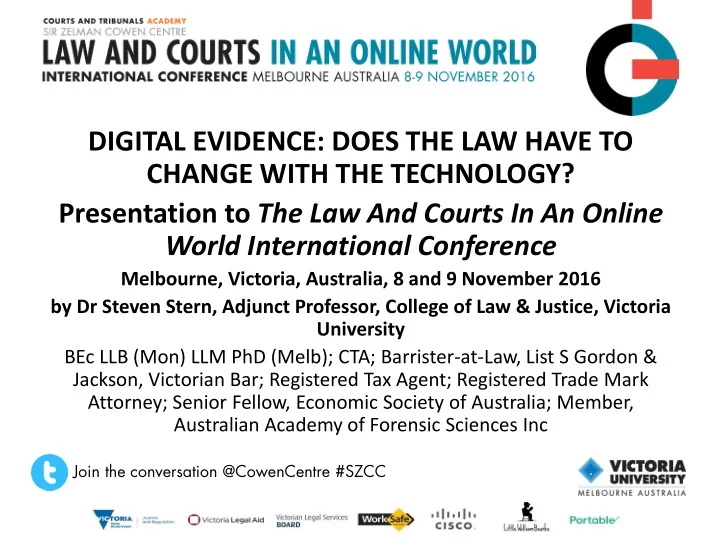

DIGITAL EVIDENCE: DOES THE LAW HAVE TO CHANGE WITH THE TECHNOLOGY? Presentation to The Law And Courts In An Online World International Conference Melbourne, Victoria, Australia, 8 and 9 November 2016 by Dr Steven Stern, Adjunct Professor, College of Law & Justice, Victoria University BEc LLB (Mon) LLM PhD (Melb); CTA; Barrister-at-Law, List S Gordon & Jackson, Victorian Bar; Registered Tax Agent; Registered Trade Mark Attorney; Senior Fellow, Economic Society of Australia; Member, Australian Academy of Forensic Sciences Inc Join the conversation @CowenCentre #SZCC 1
What this presentation does? • It examines whether increasing transformation of computer evidence • I.e. data from computers which were more commonly used as storage media • Into digital evidence i.e. material on an increasingly broader range of digital devices • Used more as operational tools) (Schatz, October 2007) • Should result in a change to the rules of evidence • That the courts use to determine • Whether to admit evidence into their proceedings Join the conversation @CowenCentre #SZCC 1
What are the key issues? Digital data can inherently become more volatile • By applications used such as those connected with operating on a • network Which may be distributed across multiple jurisdictions globally (US • Department of Justice, July 2016) Information technology has revolutionized society (Australian Crime • Commission, May 2009) In making these revolutionary changes, information technology • Has had the effect of opening up new spheres for applying • traditional legal rules Do the Courts’ evidentiary rules have to change substantially? • If so, how suitably to adapt to the technological changes? • Join the conversation @CowenCentre #SZCC 1
What is digital evidence? • It must be probative • It is transmitted in digital form • A party to litigation (or in inquisitorial systems, a court) wishes to use it at trial Join the conversation @CowenCentre #SZCC 1
What digital evidence may include? Emails • Digital photographs • ATM transaction logs • Word processing documents • Instant message systems • Files saved from accounting programs • Spreadsheets • Internet browser histories • Databases • Computer memory contents • Computer backups • Computer print outs • Global positioning system tracks • Logs from a hotel’s electronic door locks • Digital video or audio file • Ref: https://en.wikipedia.org/wiki/Digital_evidence#cite_note-casey-1 accessed on Friday, 21 October 2016 Join the conversation @CowenCentre #SZCC 1
Example of use of digital evidence United States investors’ claims against Australian banks • Re bank rate rigging case • Relies almost exclusively on • Trader emails, phone calls and electronic chats • Submitted by the Australian Securities and Investments Commission • In its local legal claim on • Alleged Bank Bill Swap Rate manipulation • Ref: John Kehoe, “PLO twist in bank rate rigging case” (Monday, 17 October 2016) Australian Financial Review 17 Join the conversation @CowenCentre #SZCC 1
Recommend
More recommend